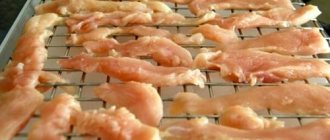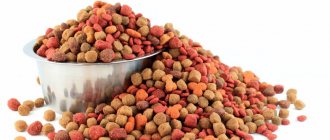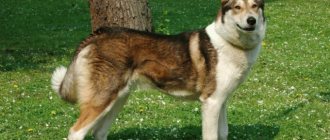The benefits of dairy products have been known since ancient times and today its popularity has not decreased at all. The drink is a source of calcium and protein and helps the growing body develop. Pet breeders wonder how important milk is in a dog's diet. The answer lies in the individual characteristics of the animal’s body and the characteristics of the breeds.
Pros and cons of milk for dogs
The healing and nutritional properties of this product have a positive effect on the health of young dogs, but for adults they are not always beneficial. The mother feeds the puppy with milk, and it grows and develops better than with artificial nutrition. We conclude that the food is useful for the animal. However, the older the dog, the worse the nutrient fluid is absorbed. This is due to a decrease in production and the gradual disappearance of the enzyme responsible for processing milk. Despite this, it is possible and necessary to give fermented milk products to animals; they maintain the level of calcium in the body at a high level, strengthen bones and muscle tissue, and are a source of protein.
In adulthood, dogs are allowed to feed milk if there are indications from a doctor and in the absence of allergic reactions to the product. If puppies can pour fresh cow's or goat's milk into a bowl, then for older animals it is better to use kefir and cottage cheese.
There are cases when dogs love milk so much that they categorically do not want to give it up. In such situations, proceed as follows:
- Purchase a product with a minimum percentage of fat content.
- They use goat's milk diluted with water; it contains less lactose, which reduces the risk of allergies.
- Pet stores have special analogues that do not contain a dangerous component. You can buy them.
Regardless of the choice, such products are given to adult dogs no more than 2-3 times a week.
If dairy products are prescribed to animals by veterinarians, for example, when the development of young animals is delayed, it is better to cook porridge. Good weight gain was noted in puppies when fed semolina with milk. But the product should not be abused. If children are given high-calorie food daily, then it is contraindicated for adults.
Dairy products
It is better to replace milk with fermented milk products, of which there is a huge variety. What foods can you give your dog?
This includes kefir and yogurt . They are simply necessary for the body, much more harmless and useful. This happens because fermented milk products contain bacteria and yeast that transform lactose into lactic acid.
Cottage cheese can be the basis of feeding, but it should not be too fatty.
This means that the animal’s body will not have to process lactose on its own, especially since there may not be enough enzyme for this.
In addition, such products improve intestinal function because they contain probiotic cultures.
You can give your dog yogurt , but it must be unsweetened, without various dyes and fillers.
But there are fermented milk products that are too fatty for the animal’s body. For example, sour cream .
Cream with a fat content of 10% can be used when the puppy is weaned from its mother. They are added to porridges or used as a basis for nutrition, but a higher percentage of fat content cannot be used. For a puppy, one spoon of cream will be enough.
Cheese is a fairly fatty product and is not recommended for dogs. It can be used as a measure of encouragement or a rare treat. In this case, you should choose varieties that are firm, low in fat and lactose.
Ice cream should not be given to dogs . It contains milk, butter, sugar. This mixture has a very detrimental effect on the health of the dog, although animals simply adore it.
Fermented milk products are more beneficial for animal health, but they should be consumed with caution, choosing the least fatty products. Do not forget that the basis of the dog’s diet should be meat or balanced dry food of good quality.
Cases of lactose intolerance in dogs
Lactose intolerance is legendary; a high percentage of the world's population suffers from this type of allergy. Animals are no exception. Given the increase in negative reactions to the component, various conclusions are drawn. Some biologists suggest that the cause is a deteriorating environmental situation, others blame the antibiotics that are fed to animals and people.
Negative reactions to lactose in dogs are known and, unfortunately, they are not uncommon. Therefore, dairy should be introduced into your pet’s diet with extreme caution, just like for infants. Cook liquid porridge, preferably oatmeal or semolina, in milk and water in a 1:1 ratio and give it a little at a time, observing the animal’s reaction.
Manifestations of allergies can be different. Some dogs immediately experience bloating and intestinal upset, while others experience vomiting or other combined symptoms. Regardless of the reaction, you should consult a doctor to confirm the fact of intolerance to the component.
Sometimes skin itching and redness are signs of a lactose allergy. Some owners mistake this for seasonal shedding or a reaction to detergents. If any strange symptoms appear in your dog while introducing dairy products into the diet, you should contact your veterinarian.
How to choose milk for a dog
Why can't a hedgehog be given milk?
This product is not food for an adult dog. In their natural habitat, predators do not feed on it after weaning from their mother and feel great.
If puppies are left without colostrum, it is better to feed them special mixtures
It’s a different matter when we are talking about four-legged animals that were left without colostrum at an early age. In this case, can puppies be given milk? It is better to give preference to special dry mixtures, widely available in specialty stores, since goat and cow milk cannot compare with dog milk.
Note! A large number of lactose-free drink substitutes have also been developed for adult pets. If you still want to pamper your little friend with natural milk, then it is better to find a homemade supplier to reduce the risk of allergic reactions.
Types of milk in dog nutrition
It turns out that the animal’s reaction depends on the type of milk. A cow, goat and horse have completely different compositions of nutrient fluid, and accordingly, their effect on the body. For dogs, as for people, it is recommended to choose a drink based on its benefits and ease of digestion.
Goat
The best product for feeding newborns and animals. Despite the somewhat specific taste and aroma, the product is extremely useful and is not inferior in properties to the mother’s. The maximum concentration of vitamins and microelements is perfectly absorbed and lays the foundation for the immune system. The amount of allergen is minimal, so negative perception of the product is reduced to zero. Despite this, milk is first given diluted to drink, then they begin to cook porridge with it, and only after that they are allowed to drink it in its pure form.
Cow
The most common type of product, widely used for feeding puppies. It contains a lot of lactose, but if there is no reaction, the animal can be fed cereals with milk for up to a year, gradually reducing its amount. Kefir and cottage cheese can be left in the animal’s diet forever, if the products are well tolerated.
Kobylye
The product is radically different from the above in composition. It is low in protein and fat, and lactose is present in excess. Veterinarians are categorically against the use of this product for feeding dogs. Kumis is made from milk; it is contraindicated for animals and children due to the presence of alcohols in the composition.
Benefit or harm?
Cow
Cow's milk is very different in composition from dog's milk . It contains almost 3 times less proteins and fats, as well as phosphoric acid, iron and lime. Therefore, when feeding puppies, cow's milk is supplemented with raw chicken eggs to balance the composition of nutrients and increase calorie content. But keep in mind that due to the high lactose content, cow's milk can cause diarrhea.
Goat
Goat's milk is healthier than cow's milk : it contains more proteins, fats (precisely unsaturated), calcium and easily digestible vitamin A. It is better absorbed, so it is recommended to give it to puppies much more often than cow's milk.
But in any case, you need to constantly monitor the condition of the dog’s feces: it should not be liquid . Diarrhea is a bad sign and a reason to immediately stop giving milk, or give it, but dilute it with water.
Milk in the diet of a puppy and an adult dog
The differences between the diet of a puppy and an adult dog are known to all breeders. Dairy products also vary depending on the age, breed and body characteristics of the animal.
If for young dogs a high-calorie diet with a high content of calcium and protein is recommended, which has a positive effect on the formation of bone structure, then such a diet is dangerous for adult dogs.
A mature animal does not absorb vitamins and microelements contained in pure milk well. He can be given foods in the form of yogurt, cottage cheese, sour cream, kefir.
It is important to monitor the freshness of food. For example, kefir is useful only during the first day, cottage cheese a little longer.
Cheese is not recommended for dogs; you can sometimes treat them to a piece, but not more than once a month.
What kind of milk can I give?
If the dog still loves milk, a small amount will even be beneficial for the animal (this, of course, does not apply to cases of lactose and casein intolerance, when any dairy products are contraindicated). From the wide variety of milk, it is better to choose the safest one.
Cow
It contains a large amount of lactose, which is harmful to the animal, and the composition is not at all similar to dog milk. But if you add raw yolk to it, this will increase the calorie content of the product and balance the amount of nutrients.
Owners of still-blind pets should avoid this product: drinking cow's milk can cause dysbacteriosis. It is advisable to give milk to older puppies standing or in the form of curdled milk. It will be useful when taken no more than 6 times a month in a diluted form. It is better to reduce the consumption of cow's milk to zero by adult dogs.
Goat
It contains a small amount of lactose and therefore goat's milk is easily digested: it rarely causes allergies and diarrhea in dogs. The product is suitable even for the oldest animals. Goat milk contains a large amount of cobalt, which helps normalize metabolism and support immunity.
The albumin and saturated fat content makes it a healthy treat for very small dogs. Potassium has a beneficial effect on the functioning of the cardiovascular system. Vitamins A and B help regulate metabolic processes and normalize the functioning of the nervous system.
However, the excess composition of vitamins can cause harm - provoke hypervitaminosis. Therefore, it is better to consume milk in moderation, and then it will only bring benefits: the calcium it contains will strengthen bones and teeth, iron will provide the body with oxygen, and copper will help regulate metabolic processes.
Like other types of milk, an animal can also be allergic to goat milk. From the beginning of complementary feeding, it is important to monitor the general condition of the dog: if your pet begins to have diarrhea, it is better to refuse the product.
Kobylye
The product consists of almost 90% water and is superior to cow and goat in terms of calories. But it contains much more lactose than the latter.
Due to its “heavy” composition, the product is not recommended for dogs with gastrointestinal problems. More often than other types, mare's milk causes intolerance. That is why veterinarians strongly advise against giving it to dogs.
Dog diseases and milk
Dog owners often think that foods that are healthy for humans will benefit their pet - this is a misconception. For example, milk is used to treat colds in people, but if a dog is sick, this method of treatment may not only not help, but also harm.
Often, animals are given milk when they are poisoned, in the belief that it will help neutralize toxins. Indeed, this is possible if lead, mercury or other heavy metal salts enter the body. This is a rare case. In other cases of intoxication, milk will not only not help, but will also worsen the situation.
In case of poisoning, dogs are given light food that is easily digested and does not overload the gastrointestinal tract.
Sometimes with diarrhea and vomiting, breeders try to help the pet by feeding it milk. This only worsens the situation; enteritis requires a large amount of fluid and properly selected medications, which can only be prescribed by a veterinarian. Self-medication is never beneficial.
If dogs without allergic reactions regularly eat dairy products, other unpleasant consequences may occur. For example, urolithiasis. It develops against the background of a high concentration of calcium, which forms stones of various shapes and sizes. It is these diseases that are difficult to treat and can be fatal for the animal. Dairy products are especially dangerous for a number of breeds predisposed to KSD. These are dwarf poodles, Yorkies, Shih Tzus, and Bichon Frizes.
If we talk about the benefits and harms of milk for dogs, then during the period of illness it is an undesirable product, and during the lactation period in a lactating bitch it is recommended.
Regardless of whether a dog drinks milk just like that or as directed, it is necessary to carefully monitor its health. If there is the slightest disturbance in the gastrointestinal tract or allergic disorders, the product should be excluded and consult a doctor.
So can you give dogs milk or not?
From about four months of age, the puppy is completely transferred to a full-fledged adult diet (feed or natural food). At this time, milk can be completely excluded from the diet without harm to the dog’s health. But this does not mean that we must categorically abandon it.
According to average statistics (no scientific studies have been conducted), based on observations of dog owners and veterinarians, 40% of adult dogs suffer from lactose intolerance. They almost completely lack an enzyme capable of breaking it down. After drinking milk, the dog suffers from diarrhea, bloating, and in some cases allergic reactions are observed. In such cases, the only correct answer is a categorical “no” - the dog should not be given milk.
The remaining 60% of dogs are among the lucky ones whose bodies cope well with lactose. If your pet does not suffer from an upset stomach, you can safely give your dog milk to drink or prepare milk porridge for it.
You may be wondering what cereals can be given to dogs.
Mr. Tail recommends: allowed and prohibited dairy products for dogs
Throughout its life, the dog should receive dairy products in small quantities; they carry essential substances and microelements. However, the use of dairy in the diet is permissible only in the absence of an allergy to lactose; if it is present and confirmed by a veterinarian, the product should be completely excluded.
Dogs are allowed fermented milk, with the exception of cheese, and whole milk during puppyhood.
Dogs that are allowed to include dairy in their diet should pay attention to the following list.
Cottage cheese
The product with a fat content of 6-9% is suitable for feeding adult dogs and children. Give it no more than 2-3 times a week in small quantities. Depending on the size of the dog, from one to six tablespoons. For young puppies, it is optimal to add one raw egg yolk to the mixture (only from a trusted supplier to avoid salmonella infection).
Yogurt
This fermented milk product is very healthy, but only if it is fresh, without preservatives and flavoring and aromatic additives. It is quite difficult to purchase pure yogurt, but if such a product is available, it has an excellent effect on the digestion of animals and qualitatively complements the daily diet. The amount of food depends on the size and does not exceed 100 grams for a large breed dog. Accordingly, little ones are given no more than a teaspoon per day.
Kefir
Animals are not big fans of kefir and there is no particular benefit to it. The minimum amount of calcium and lactic acid bacteria contained in it is present in yogurt and cottage cheese. Ryazhenka with a low fat content can be alternated with the above types of food to diversify the diet.
Milk (up to 4 months)
You need to start introducing milk into your diet at the age of 3 weeks. To get used to adult, solid food, crushed boiled yolk is added to the liquid. Every day the animal is given a little of the composition, gradually increasing the dosage. The diet includes milk for up to 4 months; from this period it is also necessary to gradually begin to reduce its amount, replacing it with fermented milk.
In case of poisoning
If a dog is poisoned, it, like a person, needs light food that will not overload the digestive system. It can be a chicken egg, cottage cheese, oatmeal, yogurt, lean boiled meat, liver. Under no circumstances should you give milk , as it is a very heavy food and can seriously aggravate the condition of a sick animal.
Reference! Milk can only be given if the dog is poisoned by heavy metal salts: lead or mercury. The proteins that are present in this product “bind” and remove heavy metals from the body.
Milk standards in a dog's diet
The amount of whole milk varies depending on the age and weight of the pet.
A dog that has reached adulthood, that is, one year, is nominally considered an adult. Based on its weight, the dose of the product is prescribed, but the minimum portion is 100-125 ml. Puppies from 3 weeks to 2 months are allowed to give 30% less than the minimum, that is, 70-80 ml per day. For older children, the norm is increased to a glass, and upon reaching 4 months of age, the pet is transferred to kefir.
During the entire feeding period, the animal and its stool are monitored. If you have digestive problems, diarrhea or constipation, you should avoid milk.
Nursing mothers, provided there are no allergies, can receive up to 1 liter of milk per day from the last month of pregnancy until the last days of lactation. Naturally, for small breeds the dosage is much lower.
The optimal milk intake for your pet can be calculated by consulting a veterinarian, since it is individual for each animal.
Which milk-based products can be given to a dog and which cannot?
While there is still controversy surrounding the presence of raw milk in the diet of four-legged pets, it can easily be replaced with other dairy products, for example:
- kefir for active growth of puppies and normalization of digestion in adult dogs;
- Cottage cheese is a source of potassium, calcium, phosphorus, and protein. It is indicated for pregnant and lactating females;
- yogurt is a source of beneficial bacteria and yeast, as well as vitamins and minerals. It is better to choose Agusha children's yogurt for your dog.
Important! Sour cream for four-legged animals is not as healthy as cottage cheese or kefir. It can be used as a kind of supplement in the amount of 2-3 teaspoons, so as not to provoke diarrhea.
Cheese is a difficult-to-digest product for a dog’s stomach, so it is not suitable as food, but it can be used as an infrequent reward during training.
Not all dairy products are good for dogs
Consumption of the product does not pose a mortal danger to your four-legged friend. However, in an adult dog it can cause diarrhea or allergies. Puppies are less susceptible, but they are not immune to allergic reactions. Therefore, it is very important to monitor how your pet’s body behaves after consuming the product. At the first negative manifestations, the drink should be excluded from the diet or a safe analogue should be found.
How to feed
- An adult animal can pour milk into a bowl and let it drink, but the owner must decide this, taking into account the pet’s reaction, if he is sure that there will be no harm. You cannot dilute food with milk, as it contains preservatives, which when mixed with milk cause poisoning.
- For adults, milk porridges are harmful . But there are cases, such as prolonged illness, when such food is necessary. The dog needs to gain weight, but with water porridge the effect is minimal. Then you should cook them in milk diluted one to one with water.
- If milk decreases or disappears from a lactating bitch, if the puppies are taken away from their mother early, you need to continue feeding them milk. To bring cow and goat milk closer to the composition of dog milk, add a chicken egg: one per 0.5 liter. Later, the kids are given bread crumbs and porridge is cooked in milk. When switching to natural feeding, such nutrition begins at 21 days, continues for up to 1.5-3 months, and then switches to cottage cheese and fermented milk products.
- A pregnant or lactating bitch really needs protein food . Therefore, it is recommended to introduce milk, sour cream and cottage cheese into the diet. But be sure to monitor the reaction; if there is no laxative effect, you can give up to 1 liter of milk per day.
- Lactose-free milk is the best option, and the animals themselves drink it with pleasure.
- Goat milk, which does not have a high lactose content, will not cause any harm.










